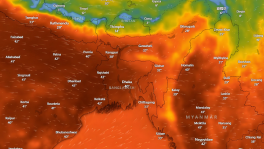Poland, Hungary, Slovakia to introduce own bans on Ukraine grains
Ukraine was one of the world's top grain exporters before Russia's 2022 invasion reduced its ability to ship agricultural produce to global markets. Ukrainian farmers have relied on grain exports through neighbouring countries since the conflict began as it has been unable to use the favoured routes through Black Sea ports

Poland, Slovakia and Hungary announced their own restrictions on Ukrainian grain imports on Friday after the European Commission decided not to extend its ban on imports into Ukraine's five EU neighbours.
Ukraine was one of the world's top grain exporters before Russia's 2022 invasion reduced its ability to ship agricultural produce to global markets. Ukrainian farmers have relied on grain exports through neighbouring countries since the conflict began as it has been unable to use the favoured routes through Black Sea ports.
But the flood of grains and oilseeds into neighbouring countries reduced prices there, impacting the income of local farmers and resulting in governments banning agricultural imports from Ukraine. The European Union in May stepped in to prevent individual countries imposing unilateral bans and imposed its own ban on imports into neighbouring countries. Under the EU ban, Ukraine was allowed to export through those countries on condition the produce was sold elsewhere.
The EU allowed that ban to expire on Friday after Ukraine pledged to take measures to tighten control of exports to neighbouring countries. The issue is a particularly sensitive one now as farmers harvest their crops and prepare to sell.
EU Trade Commissioner Valdis Dombrovskis said on Friday countries should refrain from unilateral measures against imports of Ukrainian grain, but Poland, Slovakia and Hungary immediately responded by reimposing their own restrictions on Ukrainian grain imports. They will continue to allow the transit of Ukrainian produce.
"As long as Ukraine is able to certify that the grain is going to get to the country of destination, through the trucks and trains, the domestic use ban is not really going to put a dent in Ukraine's ability to get exports out," said Terry Reilly, senior agricultural strategist for Marex. He noted that disruptions to Black Sea exports are a bigger concern.
It is unclear how much Ukraine has pledged to restrict exports or how the new bans would impact the flow of produce from Ukraine. The issue has underscored division the EU over the impact of the war in Ukraine on the economies of member countries which themselves have powerful agriculture and farming lobbies.
Ukrainian President Volodymyr Zelenskiy welcomed the EU's decision not to further extend the ban on Kyiv's grain exports, but said his government would react "in civilised fashion" if EU member states broke EU rules.
But the three countries argue their actions are in the interests of their economies.
"The ban covers four cereals, but also at my request, at the request of farmers, the ban has been extended to include meals from these cereals: corn, wheat, rapeseed, so that these products also do not affect the Polish market," Polish Agriculture Minister Robert Telus said in a statement posted on Facebook.
"We will extend this ban despite their disagreement, despite the European Commission's disagreement," added Polish PM Mateusz Morawiecki. "We will do it because it is in the interest of the Polish farmer."
Hungary imposed a national import ban on 24 Ukrainian agricultural products, including grains, vegetables, several meat products and honey, according to a government decree published on Friday.
Slovakia's agriculture minister followed suit announcing its own grain ban. All three bans only apply to domestic imports and do not affect transit to onward markets.
SOLIDARITY LANES
The EU created alternative land routes, so-called Solidarity Lanes, for Ukraine to use to export its grains and oilseeds after Russia backed out of a U.N.-brokered Black Sea grain deal in July that allowed safe passage for the cargo ships.
The EU Commission said existing measures would expire as originally planned on Friday after Ukraine agreed to introduce measures such as an export licensing system within 30 days
The EU said there was no reason to prolong the ban because the distortions in supply that led to the ban in May had disappeared from the market.
The EU said it would not impose restrictions as long as Ukraine exercises effective export controls.
Farmers in the five countries neighbouring Ukraine have repeatedly complained about a product glut hitting their domestic prices and pushing them towards bankruptcy.
The countries, except Bulgaria, had been pushing for an extension of the EU ban. Bulgaria on Thursday voted to scrap the curbs.
Romania's government, which unlike its peers did not issue a unilateral ban before May, said on Friday it "regretted that a European solution to extend the ban could not be found."
Romania said it would wait for Ukraine to present its plan to prevent a surge of exports before deciding how to protect Romanian farmers.
Romania sees over 60% of the alternate flows pass through its territory mainly via the Danube river and its farmers have threatened protests if the ban is not extended.
For the last year, Ukraine had moved 60% of its exports through the Solidarity Lanes and 40% via the Black Sea through a UN brokered deal that fell apart in July.
In August, about 4 million tonnes of Ukraine grains passed through the Solidarity Lanes of which close to 2.7 million tonnes were through the Danube. The Commission wants to increase exports through Romania further but the plan has been complicated by Russian drone attacks on Ukraine's grain infrastructure along the Danube and near the Romanian border.


 Keep updated, follow The Business Standard's Google news channel
Keep updated, follow The Business Standard's Google news channel
















